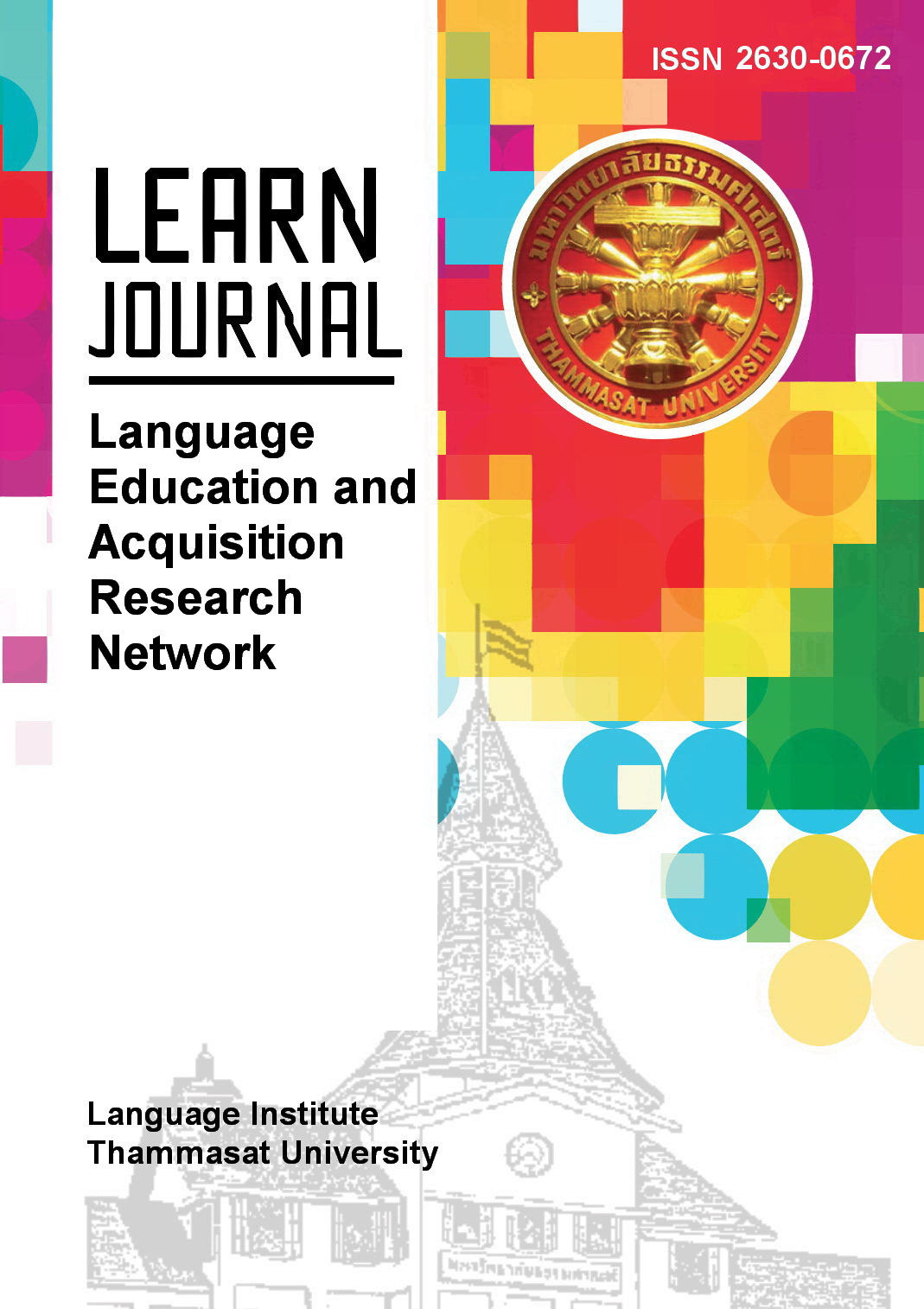SFL-driven Analysis of English Reading Materials Within the Textbooks for High School Students in Indonesia
Main Article Content
Abstract
English textbooks play a pivotal role as the primary sources of English input for Indonesian students. Hence, this textbook analysis study aimed to investigate the conformity of English textbooks’ reading materials to the K-13‘s genre-based materials. Also. It aimed to evaluate the quality of reading material presentation in the English textbooks in support of English acquisition as informed by the comprehensible input theory. The analysis framework was designed resting upon the systemic functional linguistic theory. The analysis incorporated five English textbooks designed for senior high school students in Indonesia as the analysis objects. Thirty reading passages were selected purposively from the five textbooks as the representatives of analysis objects. The study’s trustworthiness was maintained seriously. The findings demonstrated that the English textbooks’ reading materials, in general, were aligned with those of the K-13. Nevertheless, the textbooks presented few text types not recommended by the K-13 manual, and one compulsory text type was absent. This study endorsed the comprehensible input theory to provide a positive and constructive criticism to English textbook developers in order to make proper revisions of the materials supporting students’ ease of English acquisition and teachers’ ease of material delivery. Implications, limitations, and suggestions for future’s research are given in the end.
Article Details
References
Abraham, T. H. (2021). A method for developing trustworthiness and preserving richness of qualitative data during team-based analysis of large data sets. American Journal of Evaluation, 42(1), 139–156. https://doi.org/10.1177/1098214019893784
Ahmad, M., & Shah, S. K. (2019). A critical discourse analysis of gender representations in the content of 5th grade English language textbook. International and Multidisciplinary Journal of Social Sciences, 8(1), 1–24. https://doi.org/10.17583/rimcis.2019.3989
Alter, G. (2021). All inclusive?: A critical textbook analysis for the representation of diversity in Grade 9 English textbooks. Zeitschrift Fur Fremdsprachenforschung, 32(1), 81–104. https://api.elsevier.com/content/abstract/scopus_id/85107178521
Biber, D., & Conrad, S. (2019). Register, genre, and style. Cambridge University Press.
Cheng, A. (2019). Examining the “applied aspirations” in the ESP genre analysis of published journal articles. Journal of English for Academic Purposes, 38, 36–47.
Dalimunte, A. A., & Pramoolsook, I. (2020). Genres classification and generic structures in the English language textbooks of economics and Islamic economics in an Indonesian university. LEARN Journal, 13(1), 1–19.
Derewianka, B., & Jones, P. (2012). Teaching language in context. Oxford University Press.
Dinh, T. N., & Sharifian, F. (2017). Vietnamese cultural conceptualisations in the locally developed English textbook: a case study of ‘Lunar New Year’/‘Tet.’ Asian Englishes, 19(2), 148–159. https://doi.org/10.1080/13488678.2017.1279763
Eggins, S. (1994). An introduction to systemic functional linguistics. Pinter.
Feng, W. D. (2019). Infusing moral education into English language teaching: an ontogenetic analysis of social values in EFL textbooks in Hong Kong. Discourse: Studies in the Cultural Politics of Education, 40(4), 458–473. https://doi.org/10.1080/01596306.2017.1356806
Flowerdew, L. (2020). The academic literacies approach to scholarly writing: a view through the lens of the ESP/Genre approach. Studies in Higher Education, 45, 579–591.
Galloway, N. (2017). Global Englishes and change in English language teaching: Attitudes and impact. Routlage Taylor and Francis Group.
Halliday, M.A.K. (2004). An Introduction to Functional Grammar. Edward Arnold.
Halliday, M.A.K. (2009). Language as social semiotic: towards a general sociolinguistic theory. Language and Society, 10(1975), 169–201.
Hyon, S. (1996). Genre in three traditions: Implication for ESL. TESOL Quarterly, 693–722.
Ilieva, R. (2018). Textbooks. In J. I. Liontas, T. I. Association, & M. DelliCarpini (Eds.), The TESOL encyclopedia of English language teaching (pp. 1–13). John Wiley & Sons, Inc. https://doi.org/10.1002/9781118784235.eelt0666
Isnaini, F. (2019). A visual semiotic analysis of multicultural values in an Indonesian English textbook. Indonesian Journal of Applied Linguistics, 8(3), 545–553. https://doi.org/10.17509/ijal.v8i3.15253
Kramsch, C. (2013). Culture in foreign language teaching. Iranian Journal of Language Teaching Research, 1(1), 57–78.
Krashen, S. D. (2004). The power of reading: insights from the research. Heinemann Publishers Ltd.
Li, Y., Ma, X., Zhao, J., & Hu, J. (2020). Graduate-level research writing instruction: Two Chinese EAP teachers’ localized ESP genre-based pedagogy. Journal of English for Academic Purposes, 43.
Liddicoat, A. J., & Scarino, A. (2013). Intercultural language teaching and learning. Wiley-Blackwell.
Martin, J. R. (2014). Evolving systemic functional linguistics: beyond the clause. Functional Linguist, 1(3). https://doi.org/https://doi.org/10.1186/2196-419X-1-3
Martin, J. R., & Rose, D. (2007). Working with discourse: Meaning beyond the clause. Continuum.
Martin, J. R., & Rose, D. (2008). Genre relations: Mapping culture. Equinox.
Miles, M. B., Huberman, A. M., & Saldana, J. (2014). Qualitative data analysis: A methods sourcebook. SAGE Publications, Inc.
Morganna, R., Sumardi, & Tarjana, S. S. (2020). Tertiary English students’ attitudes towards intercultural language learning. Indonesian Journal of Applied Linguistics, 9(3), 657–665. https://doi.org/10.17509/ ijal.v9i3.23216
Nunan, D. (2008). Exploring genre and register in contemporary English. English Today, 24(2), 56–61. https://doi.org/10.1017/S0266078408000217
O’Connor, C., & Joffe, H. (2020). Intercoder reliability in qualitative research: Debates and practical guidelines. International Journal of Qualitative Methods, 19, 1–13. https://doi.org/10.1177/1609406919899220
Patrick, M. (2019). Free voluntary reading and comprehensible input. Journal of Classics Teaching, 20(39), 78–82. https://doi.org/10.1017/S2058631019000126
Rose, D. (2012). Genre in the Sydney school. In The Routledge handbook of discourse analysis (pp. 209–225). Routledge.
Santosa, R., Djatmika, & Khrisna, D. A. (2021). Genre and attitude to support character development in children stories. Register Journal, 14(1), 83–98. https://doi.org/http://dx.doi.org/10.18326/rgt.v14i1
Thompson, G. (2014). Introducing functional grammar (3rd ed.). Routledge.
Widodo, H. P. (2018). A critical micro-semiotic analysis of values depicted in the Indonesian ministry of national education-endorsed secondary school English textbook. In P. H. Widodo, L. V. Canh, M. R. G. Perfecto, & A. Buripakdi (Eds.), Situating moral and cultural values in ELT materials: The southeast Asian context (pp. 131–152). Springer.
Xia, Y. (2014). Language theories and language teaching—from traditional grammar to functionalism. Journal of Language Teaching and Research, 5(3), 559–565. https://doi.org/10.4304/jltr.5.3.559-565
Yazan, B. (2015). Three approaches to case study methods in education: Yin, Merriam, and Stake. The Qualitative Report, 20(2), 134–152. http://nsuworks.nova.edu/tqr/vol20/iss2/12
Zhou, W. (2021). Vocabulary analysis of English major textbooks based on range software. Journal of Physics: Conference Series 1856 012020. https://doi.org/10.1088/1742-6596/1856/1/012020


